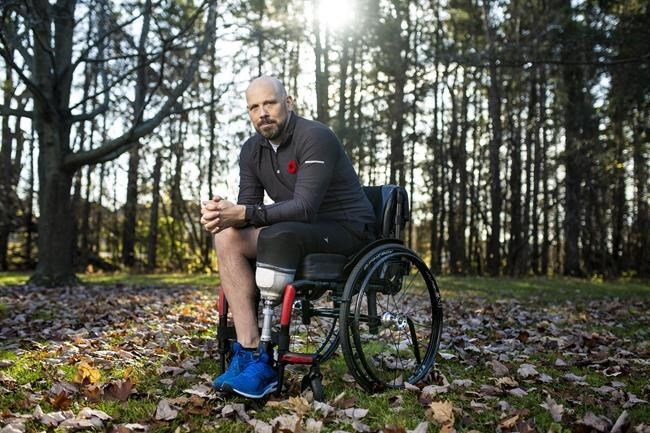OTTAWA — Winter hasn't arrived yet in the Niagara region, but the rain and cold the last few weeks have kept Stephen La Salle from leaving home as often as he'd like.
Every time the retired naval lieutenant goes out, his wheelchair is exposed to the elements in the bed of his truck because Veterans Affairs has refused to pay for a cover to protect it.
It's an example of the "almost demeaning" bureaucracy La Salle said he's encountered in the department since he left the Canadian Armed Forces last fall.
"They're looking at things from … a policy and a cost basis, but not what's going to have the best impact on the veteran and their quality of life," he said.
La Salle's leg was amputated below the knee after he was injured during a training exercise in 2018. He suffered a rare nerve injury that caused chronic pain and that still prevents him from being able to walk with a prosthetic.
When his occupational therapist learned he had been hauling his wheelchair up over the tailgate of his truck and then hopping to the driver's seat, she recommended he get a hydraulic lift along with an access cap and a heating system to protect the chair.
Veterans Affairs paid for the $6,600 lift in August, and now he can safely load the wheelchair from the driver's side. But installing it required removing the cover he had on the truck bed, creating another problem.
"(The wheelchair is) either soaking wet, it could be cold to the touch or it could have snow on it," La Salle said.
"Although these may sound like small, inconsequential things, the wheelchair is really an extension of my legs."
Veterans Affairs said the access cap and heating system, estimated to cost around $20,000, "cannot be considered as VAC-eligible treatment benefits."
"VAC does not fund storage requirements for mobility devices. You, or some other responsible person, must provide reasonable care of the prescribed mobility device, including ensuring that it is properly stored and protected from the elements," the department wrote to La Salle in August.
The letter also said the department "must consider the simplest option(s) to meet your needs."
La Salle has filed an appeal of the decision. "I think the bureaucracy needs to be changed and become more veteran-focused," he said.
A spokesperson for the department said Veterans Affairs cannot speak about specific cases due to privacy laws and noted that all requests for special equipment are assessed on a case-by-case basis.
"VAC considers the advice of occupational therapists and other health professionals when considering what items are required to support a veteran's needs," the department said.
La Salle's experience with Veterans Affairs has been frustrating from the start, he said.
He was among more than 23,000 veterans waiting for their disability claims to be approved last November. Then the Royal Canadian Legion stepped in to help get his claim fast-tracked.
Before that intervention, it wasn't clear he would be covered at all. La Salle said he was told that his original injury — the torn ligaments and nerve damage — was no longer an issue because the leg had been amputated.
"According to (Veterans Affairs), I didn't have an approved condition," he said.
More than a year after that issue was solved, he is still waiting for approval to get financial help so he can renovate his bathroom.
There have been concerns about the quoted cost, he said. In the meantime, he's supposed to rely on a personal support worker to help him use the shower safely.
"You're already dealing with life-altering injuries and all these things make it that much more difficult."
This report by The Canadian Press was first published Dec. 9, 2023.
Sarah Ritchie, The Canadian Press




